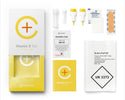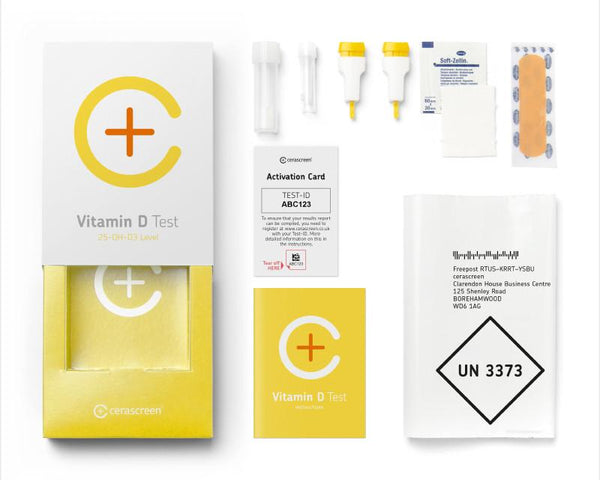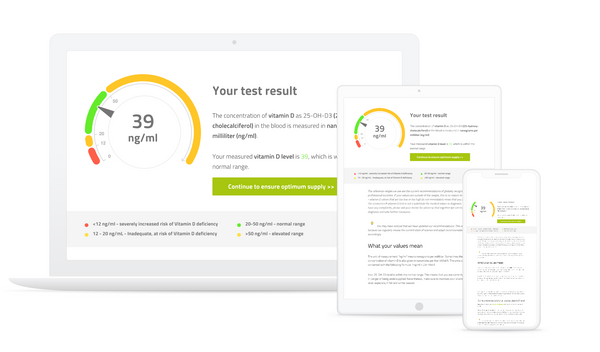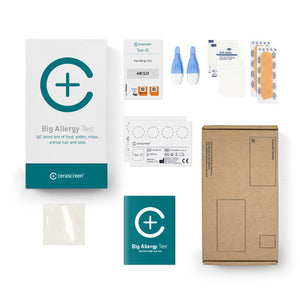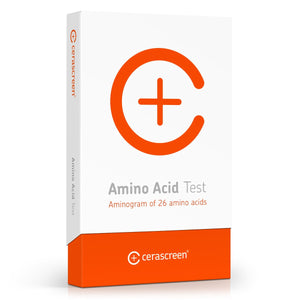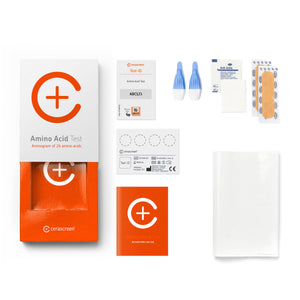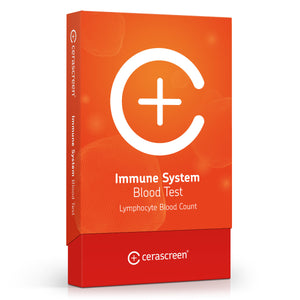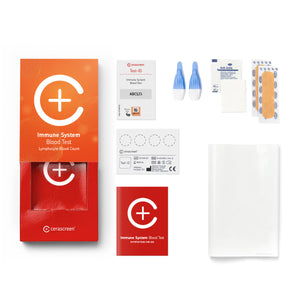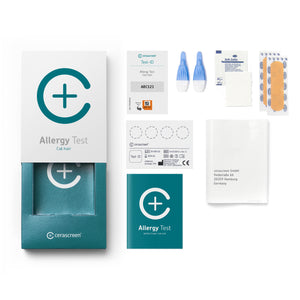product_id = 184297488403variant_id = 39719298793531template_name =

Vitamin D Test - 4 Pack
About the test
With the cerascreen® Vitamin D Test, a diagnostic send-in test that you can use at home, you can determine your blood concentration of vitamin D and to monitor the level of 25-OH vitamin D in your blood. The Vitamin D Test includes a free return envelope and analysis in our diagnostics laboratory as well as a detailed results report.
Vitamin D Test - 4 Pack
- Monitor your vitamin D levels closely at the convenience of your home with this bundle containing of 4 Vitamin D Tests
- Save money by purchasing the Vitamin D Test in a bundle
- Take your sample at home – conveniently and discreetly
- Receive a state-of-the-art laboratory analysis
- Get an idea of your vitamin D levels
- Benefit from specific recommendations to prevent vitamin D deficiency
- Receive the result within a few days after your sample’s arrival at the laboratory
Benefits of the Vitamin D Test - 4 Pack
Too little vitamin D is detrimental to health. A vitamin d deficiency can lead to symptoms such as fatigue, headaches and muscle weakness. Sometimes it goes unnoticed – and yet in the long run, it increases the risk of osteoporosis, bone fractures and other diseases.
Test yourself at home and save time. You don’t have to spend any time in waiting rooms at your doctor’s surgery. Instead, take your health into your own hands. You can take the sample comfortably and discreetly at home.
It’s easy to look after your health. Do you suspect a vitamin d deficiency? Then it is easy to optimise your vitamin D levels with our recommendations. This way, you can keep your levels optimal all year round and improve your health, well-being and performance on your own.
Benefit from our expertise: cerascreen® is the market leader for medical sampling and submission kits in Europe, with eight years of experience in test development and analysis. We have developed more than 50 approved send-in test kits (medical devices), evaluated 250,000 samples and serve 19 countries.

Result of the Vitamin D Test - 4 Pack
As soon as your sample has been analysed, you will receive your results report via the My cerascreen® app or your user account on our website. You can easily view the report on your smartphone, tablet or computer and print it out, if required.
Find out whether your vitamin D levels are within the optimal range in the laboratory analysis. Learn how to improve your vitamin D levels through concrete recommendations for action. You will also receive comprehensive health information, in which we go into detail about the functions of vitamin D and explain what it does in our bodies.
Frequently asked questions about Vitamin D Test - 4 Pack
Why take the Vitamin D Test?
Vitamin D deficiency is widespread in the Western world. What is the reason for this? Many people simply don’t get enough exposure to sunlight. In addition, our geographic locations mean we receive too little sunlight to fill our vitamin D reserves.
A vitamin D deficiency causes symptoms such as fatigue, digestive problems and headaches. In addition, a deficiency can be detrimental to our health in the long term. Among other things, it increases the risk of bone fractures and osteoporosis. In scientific studies, people with health conditions such as cardiovascular disease, diabetes, depression and high blood pressure also often have a vitamin D deficiency too. Researchers suspect that too little vitamin D could increase the risk of these diseases.
It is therefore worthwhile for most people in central and northern Europe to check their vitamin D levels and optimise them if necessary. With the Vitamin D Test from cerascreen®, you can determine your levels – from home, anonymously and without waiting at the doctor’s surgery.
Who should take the Vitamin D Test?
A Vitamin D Test is worthwhile for almost everyone in central and northern Europe. In these latitudes, it is difficult to produce enough vitamin D for the whole year through exposure to the sun.
There are, however, some risk groups. The test is particularly suitable for you if the following applies to you:
- You suffer from symptoms such as chronic fatigue, headaches, muscle and bone pain or constant infections
- You spend little time in sunlight
- You suffer from intestinal diseases such as Crohn’s disease or coeliac disease
- You have an increased risk of osteoporosis
- You are 60 years old or older
- You have a dark skin type, so your skin needs more UV radiation to produce vitamin D
How does the Vitamin D Test work?
For the Vitamin D Test, take a few drops of blood from your fingertip with a lancet. Then, send your blood sample by return envelope to our specialised laboratory that measures the concentration of 25-(OH)-D in your blood serum.
How long does the analysis take in the laboratory?
Once your sample has arrived at the laboratory, it will be analyzed there by specialists. How long the analysis takes depends on the exact measuring method and the processes in the laboratory.
If the sample is sent on the correct days (Sunday to Tuesday), this makes it easier for the laboratory to adhere to the times.
For the Vitamin D Test, the laboratory analysis is usually completed within 5 working days after the sample is received in the laboratory.
What does the results report tell me?
The Vitamin D Test tells you the concentration of 25-(OH)-D in your blood, in nanograms per millilitre. You get a classification, in which range your value is. Here are some examples of the ranges that many of the results fall into:
- 11 to 30 nanograms per millilitre: long-term vitamin D deficiency
- 31 to 40 nanograms per millilitre: sufficient vitamin D levels
- 41 to 60 nanograms per millilitre: good and vitamin D levels
The results report also gives you instructions on how to bring your levels into a healthy range with the help of vitamin D supplements. We give recommendations on how long you should take supplements for and which dosage we would recommend – as well as on how to keep your vitamin D levels at a healthy level for the long term.
How do I know if I am deficient in vitamin D?
Vitamin D deficiency symptoms are usually rather generic and include:
- Tiredness, fatigue and low mood
- Sleeping problems
- Headaches and backaches
- Muscle weakness and musculoskeletal pain
- Increased susceptibility to infections
It is difficult to sense a deficiency – so to speak – and for this very reason, it often makes sense to check your levels with a vitamin D test. If you know your vitamin D levels, you can optimise them with vitamin D supplements, for example.
Why do I need vitamin D?
Vitamin D is both a vitamin and a hormone. It carries out numerous important functions and metabolic processes in our body, including:
- Formation of muscle fibres and muscle cells
- Skeletal structure and bone mineralisation
- Absorption of calcium and phosphate in the intestine
- Function of the heart muscle
- Strengthening the immune system
What are good sources of vitamin D?
The human body can produce vitamin D itself, but it needs UV-B radiation from the sun to do so. More precisely, we produce the prohormone cholecalciferol (vitamin D3) with the help of sunlight, which the body converts into the active form of vitamin D (25-OH vitamin D3).
Experts recommend sunbathing for 5 to 25 minutes a day in such a way that the sun’s rays hit about a quarter of the skin’s surface – for example, your face, hands and parts of the arms and legs. But you should be careful – too much UV radiation increases the risk of skin cancer!
The optimal time in the sun depends on the following factors:
- Skin type: Darker pigmented people need more sun to generate enough vitamin D
- Season: In winter, there is less UVB radiation and so the body produces less vitamin D.
- Time of day: People who are in the sun at midday produce more vitamin D because UVB radiation is highest then.
Through food, we can cover at most 10 to 20 per cent of our daily vitamin D requirement – for example, with fatty fish such as salmon, herring and mackerel, as well as with liver and egg yolk. The sun is therefore paramount for a sufficient supply of vitamin D.
Which foods contain vitamin D?
Vitamin D3, which our body can absorb well from food, is mainly found in animal products, especially in:
- Fatty fish such as salmon, herring and mackerel
- Margarine and butter
- Liver
- Egg yolk and milk
- Plant-based foods such as mushrooms and avocados also contain vitamin D – but in a form that your body cannot absorb effectively
How much vitamin D does my body need?
For a long time, it was considered that we are sufficiently supplied with vitamin D from 30 nanograms per millilitre of blood (ng/ml). However, some doctors are of the opinion that we only fully benefit from the positive effect of the sunshine vitamin at an intake of 40 to 60 ng/ml.
Since we spend a lot of time indoors in the Western world and sometimes have few hours of sunshine a year, many of us cannot produce enough vitamin D, even in summer. Most people’s vitamin D levels are therefore below the norm all year round.
Do I only need vitamin D supplements in winter?
In winter, most people in central and northern Europe have lower vitamin D levels. Our body can hardly produce vitamin D because of the low levels of sunlight. That is why it is often helpful to counteract this with supplements.
However, many people do not have sufficient vitamin D levels – even in summer. This is due, among other things, to the amount of time we spend indoors and to the suncreams we use that protect us from UV radiation. So for some, supplements can be useful in summer too. It is simply best to find out your vitamin D levels – for example, by taking a test – and deciding on supplementation depending on your results.
Why are children under 18 not allowed to take the test?
Our tests are not suitable for underage children and adolescents under the age of 18. Under 18s cannot activate the tests online and therefore cannot receive a test result. We ask that you do not administer the tests to your children either.
Children and adolescents need much closer supervision and counselling regarding medical tests and their interpretation. Testing with lancets and chemicals is not without risk and would need to be closely supervised by guardians. In addition, the reference values we give are always based on adult data. In the case of children, the risk of misinterpreting the results would be very high.
We want to fulfil our responsibility as a provider of medical products and ensure that children and adolescents are not unsettled by measurement results that are difficult for them to interpret. Since we cannot control whether the minors' legal guardians actually consent to the test being carried out and supervise them, we exclude tests for under 18s altogether.
If you are under 18 and have purchased a test, please contact our customer support.
Why does it take up to a week for the sample to reach the lab?
Please bear in mind that your results will not be analyzed in the UK but in Germany. For that reason, it can take up to a week for the sample to arrive at the lab. This does not affect the stability of the samples, as the method we are using is optimized for long transports.
Initially, your sample is sent to our collection center in the UK. From there, it is shipped to our central sample sorting facility in Germany, which then distributes samples to our partner laboratories. Once your sample is analyzed there, you will receive a notification and can access your result online.
Please check your mailbox regularly. We will notify you as soon as your sample is sent, arrives, or is analyzed.
Why does the test have an expiration date?
The cerascreen® test kits are CE-marked medical devices, which in turn include other certified medical components such as lancets, patches, and alcohol swabs used in blood tests.
Like most medical devices, these components have an expiration date to ensure that they remain safe and effective. Many of our sample carriers – such as dried blood cards or sample tubes – are chemically treated to keep your sample stable and analyzable in our laboratory. Over time, environmental factors can affect this treatment and compromise accuracy.
Our sterile, single-use lancets also carry an expiration date to guarantee sterility and safe use up to that time.
This is how it works
1. Test at home
Your test kit contains everything you need to draw a small sample of blood from your fingertip. Then send the sample back to us free of charge in the enclosed return envelope.
2. View results online
After the evaluation in the medical specialist laboratory, you will have online access to your personal result report.
3. Act
Your access to the test results and the evidence-based findings and tips to improve your health: the my cerascreen® user profile on our website or our app.



